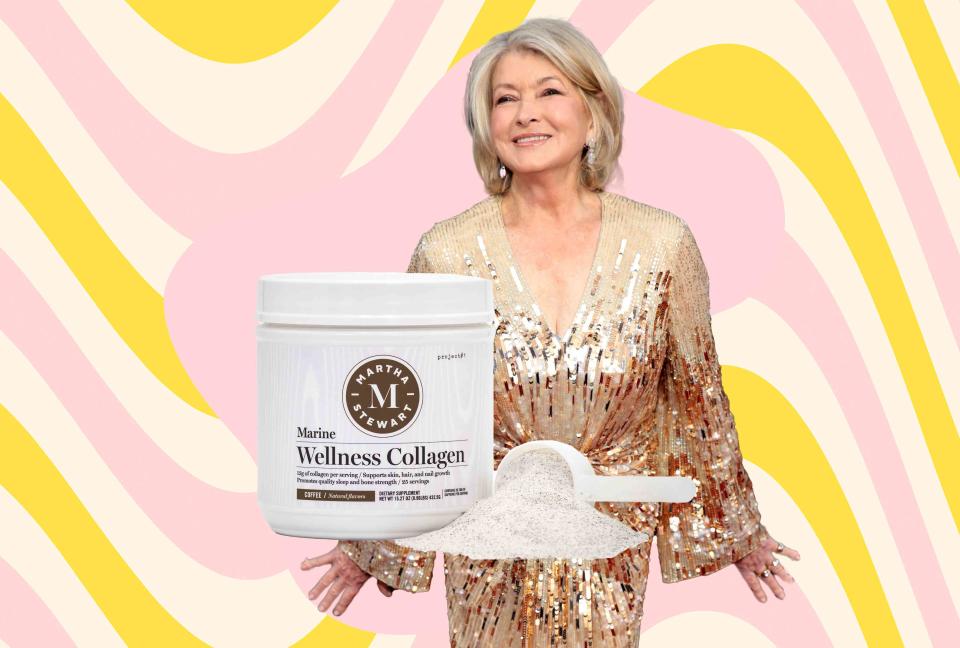Martha Stewart Just Launched a Supplement Line—Here's What a Dietitian Thinks
- Oops!Something went wrong.Please try again later.
You can now buy collagen powder with Martha Stewart’s name on it.

Stewart: Dimitrios Kambouris/Getty Images for Sports Illustrated Swimsuit. Product: Courtesy of Brand.
Reviewed by Dietitian Emily Lachtrupp, M.S., RD
As collagen powders and greens powder continue to be all the rage, Martha Stewart decided to dip her toe into the world of supplement powders with her new product line, Martha Stewart Wellness.
This isn’t her first time entering the supplement scene, as she continues to sell CBD gummies, but Stewart’s new line includes Marine Wellness Collagen, Wellness Greens and Wellness Reds powders that can be added to smoothies or other drinks. Each powder is noted to target different aspects of your health and provide varied benefits.
Are these supplement powders healthy? Here’s what our nutrition editor and dietitian Jessica Ball, M.S., RD, has to say about Stewart’s new line—plus what to keep in mind before taking any dietary supplements.
Related: Martha Stewart Just Shared Her Favorite Green Juice Recipe, and It's Ultra Hydrating
First, let’s take a look at Stewart’s new collagen powder. Available in three flavors (unflavored, lemon and coffee), each Marine Wellness Collagen scoop has 60 calories and boasts 15 grams of protein per serving.
“Collagen is a type of protein that’s found in connective tissues like our skin and joints, and our bodies actually produce it naturally. But that production can slow as we age, which is totally normal,” shares Ball. “These supplements can be a good source of protein and collagen, but there are a lot of other less expensive ways to meet your needs. Protein is found in a variety of different foods, from eggs and yogurt to nuts and legumes. And foods like bone broth, skin-on chicken and sardines are great sources of collagen.”
Related: What Is Collagen—and Is it Good for You?
While the ingredient list on the collagen powder is more simple, the greens powder and reds powder contain a longer ingredient list—and not much nutritional value.
“Like other types of supplements, many greens powders are unregulated by the FDA. This can make it hard to tell how accurate or transparent their label is,” says Ball. “It may be a way for some people to bridge a gap in their vitamin or mineral intake, but I typically prefer a food-first approach. Plus, when you eat food sources of vitamins and minerals (like vegetable and leafy greens) you get a boost of fiber that you won’t get in a supplement.”
Nutritional supplements can be an easy way to add missing nutrients into your diet, but at EatingWell, we believe that the best way to support a nutrient-packed eating pattern is to consume a well-balanced diet.
The Bottom Line
While Stewart’s supplement powders may sound promising, adding more fruits and vegetables and high-quality protein to your eating pattern is a more nutritious way to receive the healthy benefits these powders claim to have. This includes gut-health support, healthy digestion, healthy skin and more. At the end of the day, it’s best to consult your doctor or dietitian before starting any supplements.
Related: Can Too Much Protein Powder Cause Side Effects?
Read the original article on Eating Well.

